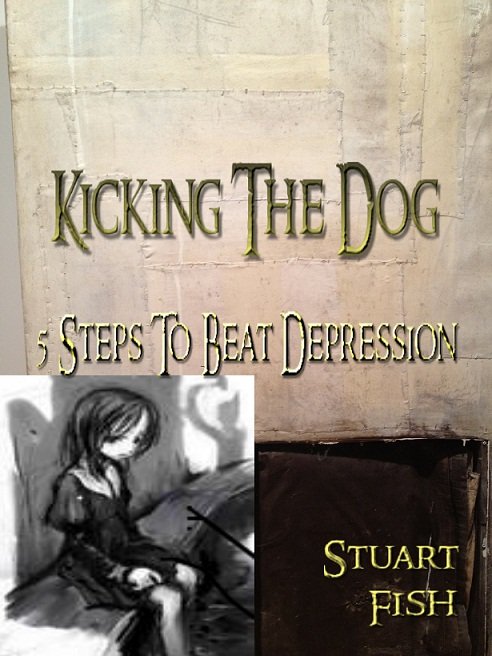I Want to Talk About What Most People Don't Like to Talk About
I Want To Talk About What People Don't Like To Talk About
We have all been there - well most of us have, anyway - but we really don't like to discuss our time there; in the darkness, often alone with our thoughts and fears. Everyone feels sad or miserable sometimes. But when these feelings are with you most of the time and you stop enjoying life and lose interest in things you used to like doing, you may well be heading there.
You guessed it. I'm talking about the black dog, or depression; an infliction that chooses to rear its ugly head now and then. I've been there on a number of occasions and each time this period of dark downtime has taken me by surprise. Why? Well, mainly because I am generally a happy, cheerful, positive, successful guy, with a loving family and supportive friends.
I don't believe I am naturally, or is that genetically, prone to depression. Mine has proven to be more circumstantial and in all three cases that I care to remember, my depression has been caused by one of two factors, sometimes individually and sometimes when the two collide.
I have written about depression, and my first two periods of quite severe depression specifically, in Kicking The Dog, an e-book I published on Amazon a few years ago. I am currently updating it and adding in my latest episode. Suffice to say that the process of rereading it, adding to it and then re-editing it has actually helped me to put the dog out to pasture this time around.
For those who don't know, the Black Dog is a name used in Australia and New Zealand to refer to depression. Apologies to all black dogs and black dog owners out there. When I first mentioned to some of my author friends in the US, that I was titling my book, Kicking The Dog, some were horrified and almost wanted to report me to Animal Welfare. But when I explained the significance of and meaning of Black Dog, they relented and let me off the hook.
What causes depression? There are many reasons that people can fall into a depressed state. Indeed, causes of depression will differ from person to person. From my reading on the subject, some of the main causes include dire financial issues, relationship breakdowns, sudden job losses, extreme family hardships and general feelings of helplessness.
Among teens: Severe and constant bullying, both physically and online through social media, can cause young people to take their own lives.
Among the aged: Loneliness can also cause some older people to succumb to depression and even consider suicide. After a relationship breakup back in 2009, I had found loneliness a real burden. But I came across an article in the local newspaper that helped kick me back into gear. It was titled "Kick back and endure being bored and uncomfortable." A short extract follows:
"Idleness in all manifestations had come under sustained attack from economists, business commentators and governments who tell us that happiness comes from having more stuff. Idleness is "unproductive"; even retirement is being loaded up with guilt.
When we are engaged in contemplation, day dreaming or self-reflection, our attention is not available for others. So advertisers have to try all means of advertising to get our attention for their clients' products...and new models of communication keep appearing to prevent us from owning our attention. The most absurd must be Twitter, which spreads like a virus for one reason only; our waning capacity to be alone with ourselves. Our brains have been rewired so we crave external stimulation to avoid succumbing to boredom.
So let us concur with the German philosopher Arthur Schopenhauer, who wrote:"...whoever at some early age is on friendly or even affectionate terms with solitude, has gained a goldmine", because it is a source of happiness and peace of mind.
At heart, the fear of solitude and boredom, and the need for constant distraction, is the fear of just being."
In recent years, and much closer to home, the severe drought in rural Australia has caused many farmers to take their own lives, rather than face financial ruin. I have often asked myself if this is a rather selfish act, as it usually leaves a wife and family to deal with the fallout - but then who knows what goes through a person's mind in such circumstances.
A well known and sobering case study:
When Robin Williams took his own life back in August 2014, the whole world was shocked. Here was a very successful and much loved entertainer, in fact a very funny and lovable character, who had made millions of us laugh with his movies and TV appearances. Yet underneath, something had eaten away at his soul, causing him to decide that enough was enough. Surely if he had ended up feeling that way, there was little hope for the rest of us.
The factors behind his suicide had been speculated upon endlessly as his colleagues and friends came forward to argue that depression had contributed to his severe mental state. But soon afterwards, his widow Susan set the record straight.
“It was not depression that killed Robin,” Susan told People magazine in one of her first interviews after losing her husband. “Depression was one of, let’s call it, 50 symptoms, and it was a small one.”
Instead, she argued that it was a debilitating brain disease called diffuse Lewy body dementia (DLB) that took hold of Williams, and probably led him to suicide.
But, again, knowing that one had only a few years of painful life left, would certainly be a very depressing realization for most of us.
Watch Robin Williams talk about golf with Parkinson on TV.
This was, in my view, one of his funniest interviews.
From my own self analysis, I have decided that the two main causes of my episodes of depression were either financial or relationship related, or both. In my most recent lapse, which descended suddenly on me less than a month ago, I was unable to get out of bed, to do any work online, to talk to family or friends or seek comfort, other than from my own presence, curled up on my bed. This lasted for some 8 days and was caused, I reckon, when I realized that where I had come to, at almost 65 years old, was not where I had planned, or expected to be, many years earlier.
Right in the middle of this period, these words came into my head:
There's a large black dog standing guard at my door
If I try to move past, it just growls even more
So I lie on my bed, in the dark, all alone
Not sure why I'm like this, but I've switched off my phone
So no-one can call me; ask "Are you okay?"
It's so easy for them...
I've got nothing to say
My mind is a mess and my thoughts make me fear
Make me cry out in silence so no-one can hear
How long have I lain here, confused and ashamed
That my life now means nothing, not at all what I'd planned
But I'm sure I could make it, if I knew what to do
Damn, this black dog's a bugger; it won't let me through
I will admit, thought, that writing these words down at 3 a.m. in the morning and then sharing them with a few friends helped me climb out of the darkness.
In Kicking The Dog, I cover 5 steps or ways that I have found can help with depression. These are:
- Know Yourself: The first step in beating depression, in kicking that dog into touch, so to say, is to acknowledge that you are depressed and to look for support.
- Talk About It: As more and more people, especially more famous film and sports stars, start to admit to suffering from depression, this should be an easy step, but it is often the hardest.
- Embrace the Treatment: If you are placed on medication, or given other tasks to do by your doctor, follow the instructions. They usually do know best.
- Do What It Takes: In other words, take action. Do more exercise, drink less, manage your weight... there are many things that will help with the way you are feeling.
- Be Patient: Depending on how deep your depression is, accept that it will take some considerable time to get out of it completely.
In part 2 of my book, I go into a lot more detail on each of these 5 steps. My e-book, Kicking The Dog, can be found on Amazon.
I would love some feedback on this post and would value any discussion with other Steemers who have suffered some form of depression, or who have helped someone else climb out of that deep, dark situation. I really do believe that it helps to talk about such situations we experience in life.
Thanks for reading my post. I look forward to your views and ideas.
Stuart Fish
steemitwitstu
Written with StackEdit.




your comment about the farmer taking his life and leaving the family with the fallout reminded me of a client I met a few years ago. Her husband had committed suicide and she was being chased by tax people. She was consumed with grief to the point she could hardly get a sentence out without sobbing.
It took a lot of patience to move through the consultation. She kept telling me details of his preparations and his actions and how they showed how much he loved her even in his final hours.
Finally, unable to keep silent any longer, I gently and quietly said to her "he probably loved you very much but to be honest in those final hours, he was more about his own despair and very little about how he was going to hurt you by leaving you. Love is being steadfast even in the bad times."
She didn't respond and I didn't expect it. At that point I had to leave the room to get a couple of questions answered by the boss. When I returned to the room I was met with her looking at me and thanking me.
She had been so consumed with trying to find love in his actions, she couldn't move into the other stages of grief like anger and acceptance.
The tax issue was resolved with a letter and the client started to move forward in life.
Thanks for your response and comments here. The hairs on my arms are still standing straight up - I got goosebumps when I read your second last para. I'm glad I haven't had to deal with family members in that situation. Cheers. Stuart
it was an eye-opener for me. I inadvertently gave her permission to feel anger .. we're always learning, even if by chance :)
I upvote U